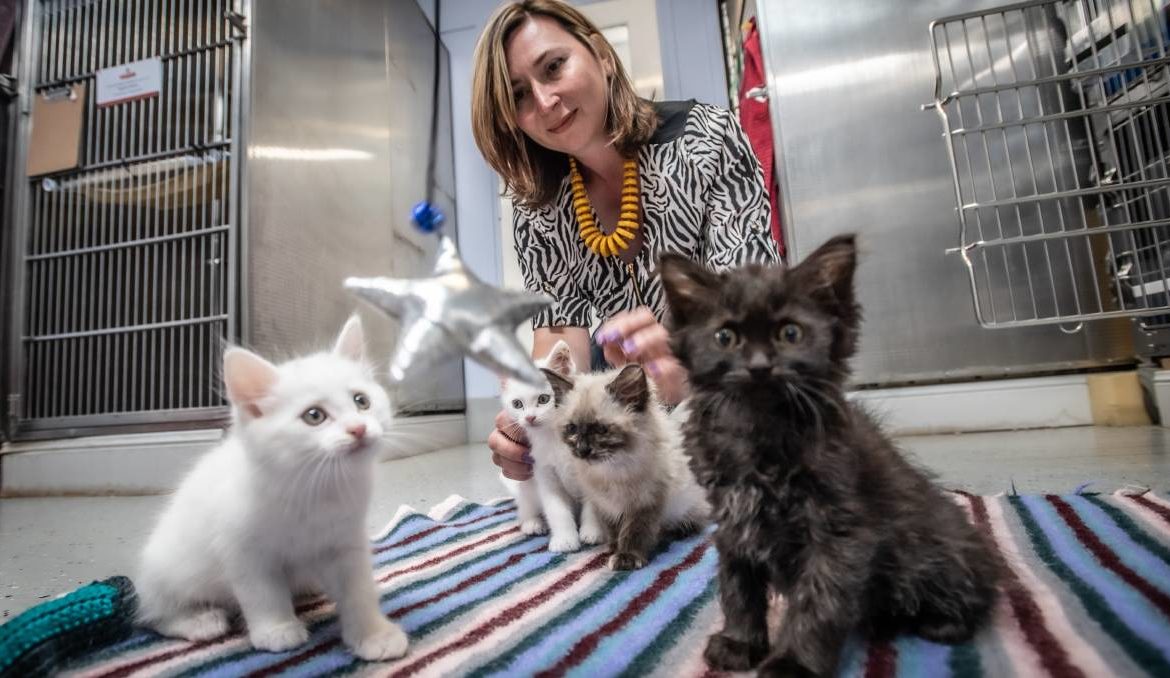news, latest-news, rspca, rspca act, cat, cats adoption, rescue cats, kitten adoption, kitten adoption canberra
Despite a surge in pet adoptions during the beginning of COVID-19 lockdowns, the RSPCA has reached peak capacity for housing rescue cats in the lead-up to Christmas. RSPCA ACT’s catteries are so full there are now long waiting lists for abandoned felines being fostered to come into the shelter in order to be rehomed. The organisation’s chief executive, Michelle Robertson, said there are more than 200 cats and kittens available for adoption, with more than 30 on a waiting list to come into the shelter. “Kitten season has started later this year compared to last year, but it’s not just a lot of kittens – we have received a lot of adult cats as well,” Ms Robertson said. “There is only so much physical space, and we only have so much resources in terms of medical specialists and animal care, and we try to strike a balance.” The RSPCA has slashed adoption fees for adult cats to $99 until December 23 to help reduce the waiting lists. Ms Robertson said while kittens were normally quick to get adopted, in some instances adult cats will spend months at the RSPCA before they get adopted. “The average stay for a cat up for adoption is around 50 days, but one has been here for more than 100 days and that is very unusual,” she said. “We’ve got more than 200 cats in care and about 160 of them are kittens in foster care.” While the RSPCA has seen fewer animals surrendered this year, the total number of animals in care at the organisation’s Weston headquarters has grown significantly during 2020. There were 280 animals in care at the RSPCA during December 2019, but that number has risen to more than 350 as of December this year. Ms Robertson said the large amount of felines in care was putting them at risk. “Because we have so many cats, they become stressed, and just like humans, when they become stressed, their immune systems get weaker and become more susceptible to flu,” she said. “We want to keep them as healthy as possible, but if we can adopt them out to a home environment, they’ll get better much quicker.” Despite the appeal to the public to find forever homes for rescued cats, Ms Robertson said adoption standards at the RSPCA remained the same. “It remains finding the right animal for the right home and trying to get as many cats as possible into the right home,” she said.
/images/transform/v1/crop/frm/tPntrWhUbGLyDWYCTv46rt/3f7553a2-cc16-49d5-b76c-c8db6b74b4af.jpg/r0_245_5254_3214_w1200_h678_fmax.jpg
Despite a surge in pet adoptions during the beginning of COVID-19 lockdowns, the RSPCA has reached peak capacity for housing rescue cats in the lead-up to Christmas.
RSPCA ACT’s catteries are so full there are now long waiting lists for abandoned felines being fostered to come into the shelter in order to be rehomed.
The organisation’s chief executive, Michelle Robertson, said there are more than 200 cats and kittens available for adoption, with more than 30 on a waiting list to come into the shelter.
“Kitten season has started later this year compared to last year, but it’s not just a lot of kittens – we have received a lot of adult cats as well,” Ms Robertson said.
“There is only so much physical space, and we only have so much resources in terms of medical specialists and animal care, and we try to strike a balance.”
The RSPCA has slashed adoption fees for adult cats to $99 until December 23 to help reduce the waiting lists.
Ms Robertson said while kittens were normally quick to get adopted, in some instances adult cats will spend months at the RSPCA before they get adopted.
“The average stay for a cat up for adoption is around 50 days, but one has been here for more than 100 days and that is very unusual,” she said.
“We’ve got more than 200 cats in care and about 160 of them are kittens in foster care.”
Kittens are often adopted our far more quickly than adult cats. Picture: Karleen Minney
While the RSPCA has seen fewer animals surrendered this year, the total number of animals in care at the organisation’s Weston headquarters has grown significantly during 2020.
There were 280 animals in care at the RSPCA during December 2019, but that number has risen to more than 350 as of December this year.
Ms Robertson said the large amount of felines in care was putting them at risk.
“Because we have so many cats, they become stressed, and just like humans, when they become stressed, their immune systems get weaker and become more susceptible to flu,” she said.
“We want to keep them as healthy as possible, but if we can adopt them out to a home environment, they’ll get better much quicker.”
Despite the appeal to the public to find forever homes for rescued cats, Ms Robertson said adoption standards at the RSPCA remained the same.
“It remains finding the right animal for the right home and trying to get as many cats as possible into the right home,” she said.







